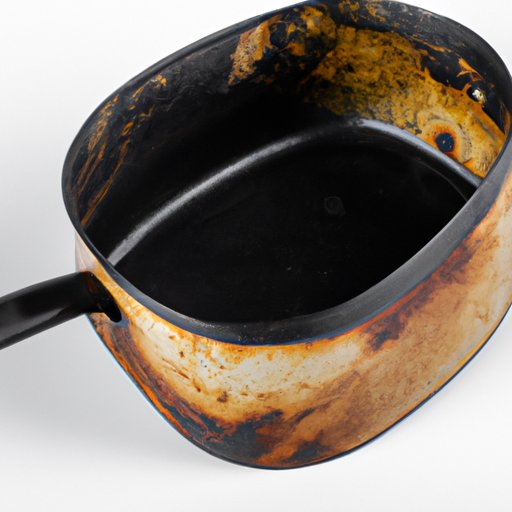
I. Introduction
Cast iron cookware has been a mainstay in kitchens for generations. It is durable, long-lasting, and has the ability to withstand high temperatures, making it perfect for a variety of cooking methods. However, one common issue that many cast iron owners face is rust. Rust can ruin the appearance of the cookware and even affect the flavor of foods. In this article, we will explore the different methods for removing rust from cast iron cookware, both naturally and chemically.
II. Analyze the Cause of Rust on Cast Iron
Rust forms when iron is exposed to moisture and air over time, causing a chemical reaction that deteriorates the metal’s surface. This is especially true for cast iron cookware. The porous nature of cast iron allows moisture to seep through the seasoning and onto the iron surface, where rust can easily form.
There are ways to prevent rust from forming, however. Properly seasoning your cast iron cookware, which involves coating it with oil and heating it in the oven, can help protect it from rust. It’s also important to dry your cookware thoroughly after washing it and storing it in a dry, well-ventilated area.
III. Natural Methods for Removing Rust from Cast Iron
A. Vinegar and Baking Soda Method
Vinegar and baking soda are popular natural remedies for removing rust from cast iron cookware.
- Fill a sink or large container with equal parts water and white vinegar.
- Submerge the rusty cookware in the solution, making sure it is completely covered.
- Let the cookware soak for several hours, or overnight.
- Remove the cookware from the solution and sprinkle baking soda over the rusted areas.
- Scrub the rust away with a scrub brush or sponge until the rust is gone.
- Rinse the cookware with water and dry it thoroughly.
It’s important to note that vinegar can be harsh on seasoning, so be sure to re-season your cookware after using this method.
B. Potato Method
Another natural method for removing rust from cast iron is the potato method.
- Cut a potato in half and sprinkle a generous amount of salt on the cut side.
- Rub the potato over the rusted areas, applying pressure as necessary.
- Rinse the cookware with water and dry it thoroughly.
The oxalic acid in potatoes helps to break down rust, making it easier to remove.
IV. The Power of Salt
Coarse salt is a great tool for removing rust from cast iron cookware because it acts as a natural abrasive that won’t damage the seasoning.
- Sprinkle a generous amount of coarse salt onto the rusted areas of the cookware.
- Using a cloth or paper towel, rub the salt over the rusted areas, applying pressure as necessary.
- Rinse the cookware with water and dry it thoroughly.
This method may take a bit of elbow grease, but it’s an effective way to remove rust without damaging the cast iron.
V. Chemical Rust Remover
If natural methods don’t work or if the rust is particularly stubborn, a chemical rust remover may be necessary.
It’s important to use caution when handling chemical rust removers, as they can be harmful if not used properly. Always follow the instructions on the package carefully and wear protective gloves and eyewear.
- Apply the rust remover to the rusted areas of the cookware, making sure to cover the affected areas completely.
- Let the rust remover sit for the amount of time indicated on the package.
- Scrub the rusted areas with a scrub brush or sponge until the rust is gone.
- Rinse the cookware with water and dry it thoroughly.
Chemical rust removers can be effective, but they should be used sparingly and only as a last resort.
VI. Wire Brush Scrubbing
Wire brush scrubbing is another option for removing rust from cast iron cookware, but it should be used with caution.
- Preheat your oven to 400°F.
- Place the rusty cookware in the oven upside down and bake for 30 minutes.
- Remove the cookware from the oven and let it cool for a few minutes.
- Using a wire brush, scrub the rusted areas until the rust is gone.
- Rinse the cookware with water and dry it thoroughly.
This method may be effective, but it can also be risky. If the cookware is not heated for long enough or if it is heated too much, it can crack or warp, rendering it unusable.
VII. Risky Methods to Avoid
While there are many methods for removing rust from cast iron cookware, there are some methods that should be avoided.
A. Steel Wool and Electrical Current Methods
Using steel wool or an electrical current to remove rust from cast iron can be risky because they can damage the surface of the cookware.
Steel wool can scratch the surface of the cookware and remove the seasoning, making it more prone to rust in the future. Electrical current methods can also damage the surface of the cookware, and they can be dangerous if not used properly.
B. Safer Alternatives to Consider
If you’re looking for a safer alternative to steel wool or electrical current methods, consider using one of the natural or chemical methods outlined in this article.
VIII. Conclusion
Removing rust from cast iron cookware may take some time and effort, but it’s worth it to keep your cookware in good condition. Whether you prefer natural methods or chemical methods, it’s important to use caution and follow the instructions carefully. Properly maintaining your cast iron cookware is key to preventing rust from forming in the first place, so be sure to season it properly, dry it thoroughly, and store it in a dry, well-ventilated area.




